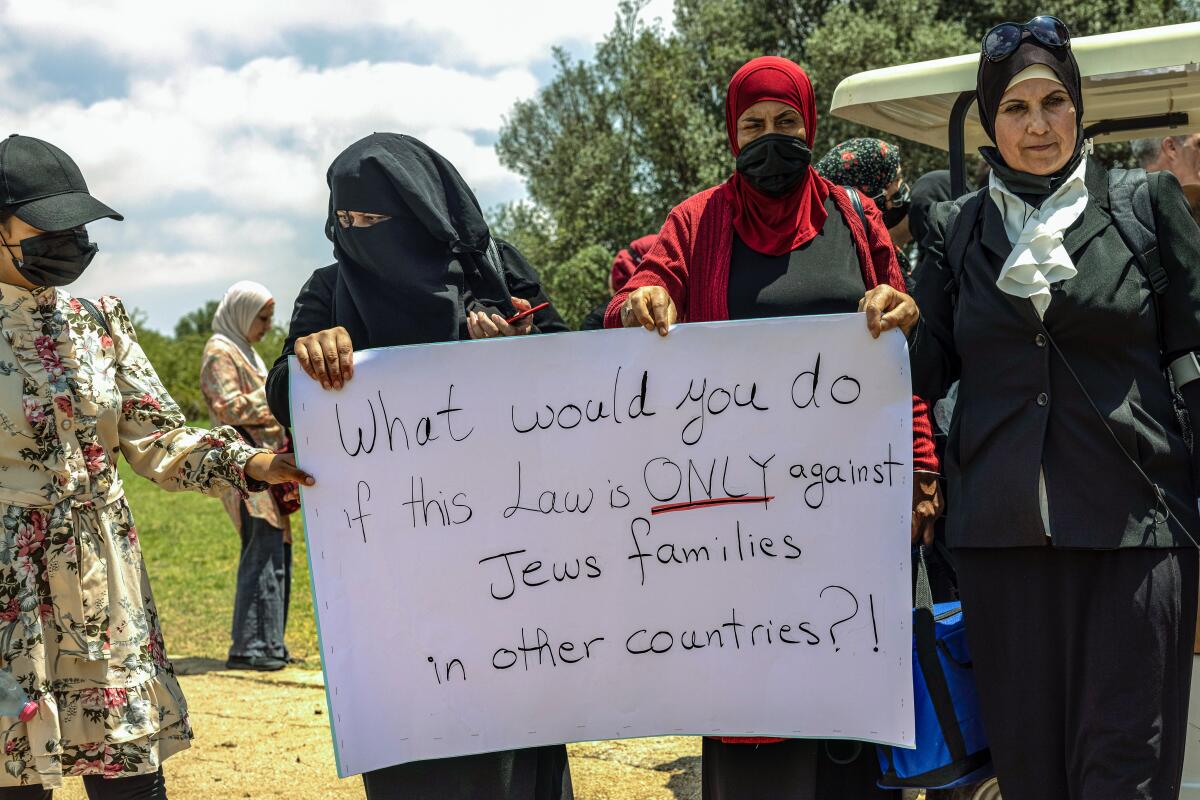Israel renews law keeping out some Palestinian spouses of Israeli citizens

- Share via
JERUSALEM — Israel’s parliament has renewed a law dating back to 2003 that bans citizenship or even residency for Palestinian spouses of Israeli citizens if the spouses come from the occupied West Bank or Gaza.
Israel says the law, which was first enacted during a Palestinian uprising, is needed for security. Critics view it as a racist measure aimed at maintaining the country’s Jewish majority. The law is aimed only at Palestinians; it does not apply to Jewish settlers in the West Bank since they already have Israeli citizenship.
The Knesset failed to pass the law last summer because it did not have the support of left-wing and Arab members of the governing coalition. The opposition, led by former Prime Minister Benjamin Netanyahu, supports the law but declined to vote for it to embarrass the government.
Interior Minister Ayelet Shaked, a staunch Israeli nationalist, took measures to prevent family unification during the several months when the law languished and as she campaigned for its renewal. She and other officials have acknowledged that it is in part aimed at preserving Israel’s Jewish majority.
The law passed late Thursday with help from the opposition but without the left-wing Meretz party or the United Arab List, an Arab party that made history by joining the governing coalition last year.
Shaked tweeted that the bill’s passage was a victory for “a Jewish and democratic state” and a defeat for “a state for all its citizens.” The latter phrase is often used by Israel’s Arab citizens to refer to aspirations for equality.
The Israel-Hamas war has helped catalyze a newfound sense of Palestinian solidarity that could mark a new moment in the Middle East, activists say.
Ayman Odeh, an Arab lawmaker, retweeted Shaked, calling it a victory for “an apartheid state.”
The law mainly affects the Arab minority, which accounts for 20% of Israel’s population of 9.5 million and has close family ties to Palestinians in the West Bank and Gaza. They have Israeli citizenship, including the right to vote, and have gained acceptance and influence in a number of spheres, but still face widespread discrimination.
The Citizenship and Entry into Israel Law was enacted as a temporary measure in 2003, at the height of the second intifada, or uprising, when Palestinians launched scores of deadly attacks inside Israel. Proponents said Palestinians from the occupied West Bank and Gaza were susceptible to recruitment by armed groups and that security vetting alone was insufficient.
The law has been continually renewed even after the uprising wound down in 2005 and the number of attacks plummeted. Today, Israel allows more than 100,000 Palestinian workers from the West Bank to enter on a regular basis.
Israel is moving ahead with plans to build a massive Jewish settlement on the site of a long-abandoned airport that Palestinians hoped to revive in a future capital.
Because of the law, Arab citizens have few if any avenues for bringing spouses from the West Bank and Gaza into Israel. The policy affects thousands of families.
The law does not apply to the nearly 500,000 Jewish settlers who live in the West Bank, which Israel captured in the 1967 war and which the Palestinians want for their future state.
Under Israel’s Law of Return, Jews who come to Israel from anywhere in the world are eligible for citizenship.
More to Read
Sign up for Essential California
The most important California stories and recommendations in your inbox every morning.
You may occasionally receive promotional content from the Los Angeles Times.












